The Painted Veil
 for some mature sexual situations, partial nudity, disturbing images and brief drug content.
for some mature sexual situations, partial nudity, disturbing images and brief drug content.
Reviewed by: Kenneth R. Morefield
CONTRIBUTOR
| Moral Rating: | Average |
| Moviemaking Quality: |
|
| Primary Audience: | Adults |
| Genre: | Drama, Romance, Adaptation of novel, Remake |
| Length: | 2 hr. 5 min. |
| Year of Release: | 2007 |
| USA Release: |
January 19, 2007 |
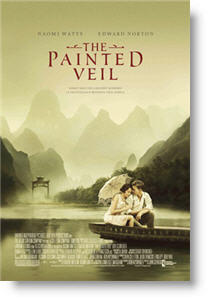
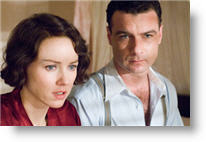
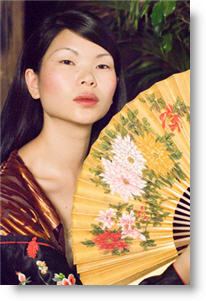

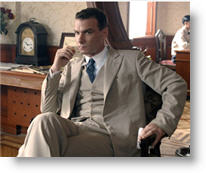

What is true love and how do you know when you have found it? Answer
What does the Bible say about adultery? Answer
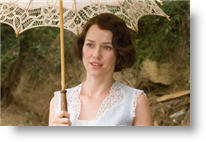
How can I deal with temptations? Answer
Should I save sex for marriage? Answer
What are the consequences of sexual immorality? Answer
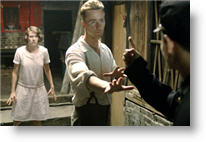
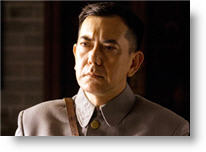


| Featuring | Edward Norton, Naomi Watts, Liev Schreiber, Sally Hawkins, Toby Jones |
| Director |
John Curran |
| Producer | Mark R. Gordon, Bob Yari, Robert F. Katz |
| Distributor |
 Warner Independent Pictures, a Warner Bros. Entertainment Company Warner Independent Pictures, a Warner Bros. Entertainment Company
|
“Sometimes the greatest journey is the distance between two people”
This film is based on a novel by Somerset Maugham.
The “Painted Veil” is a film that is in love with the idea of love. It is in such a hurry to get to its second act—in which the cuckolded Walter Fane takes his unfaithful wife into the heart of a cholera epidemic so that they can both discover too late that they actually do love rather than hate one another—that we are no more certain why Kitty was unfaithful than we are why Walter wanted to marry her in the first place. It turns out some good, old-fashioned hardship is the most effective form of couple’s therapy and that indifference is a greater sin against the idol of love than is adultery.
The biggest surprise in “The Painted Veil”—a film with precious few of them—may come in the final credits, where it is revealed that the film was shot on sound stages in Shanghai and on location in China. The film’s insistent, almost distracting, tight framing suggests soundstages to the attentive viewer; vistas were mostly used for picturesque establishing shots prior to cutting to somewhat unimaginatively shot interior or closely cropped exterior scene. So the revelation of the location shooting was a bit of a disappointment, indicating a lost opportunity to add a desperately needed sense of place to what is, after all is said and done, a rather small, domestic melodrama.
That is unless, of course, one has read the book by W. Somerset Maugham on which the film is based, in which case the film’s biggest surprise may come in the opening credits when the very American Edward Norton and the very modern Naomi Watts are introduced as the 1920s British couple of Walter and Kitty Fane.
Both are fine actors who have done superior work in other venues, but Norton especially is hampered by a character that is at odds with his iconic personality and a script that’s so ploddingly expository that there is nothing left for him to convey. In the early scenes, his reticence comes across more as modern, coy flirtation (think George Clooney) than as from someone who is truly emotionally stunted (think Henry Wilcox in “Howards End”).
An example of the latter problem would be a scene about midway through the film in which Kitty and Walter fight and Kitty leaves the room. The camera stays on Walter too long, removing any mystery as to whether he is genuinely indifferent to his wife or merely feigning (hmm, like his name) that emotion to hide his hurt. Eventually, Walter cocks his head towards the door to indicate he is listening and, for viewers who still haven’t grasped the point, walks to the door and reaches to open it only to bring himself up short.
Watts fares better than Norton, though she is saddled with several long speeches to underline the conflicts that would make more sense were she supposed to be a modern character raised to be introspective rather than a superficial, immature and bored newlywed. She is also a bit too physically imposing to fit as a character about whom we are repeatedly told is small and fragile.
Where a stronger, smarter film that trusted its audience would have let the actors convey some conflict or allowed for more ambiguity in the middle scenes, “The Painted Veil” goes out of its way to explain itself at every step. Between all that expository dialogue and the film telegraphing the emotional movement of the characters three scenes in advance, there simply isn’t much dramatic tension. When the couple finally reconnects, it feels more inevitable than surprising.
None of this means the film is particularly bad. It is drearily competent, enough so that should viewers have a predisposition to emotionally connect with the material, they may not find the lack of any deep insight or depth a problem. By the end, we’ve learned loving your spouse is better than not and that greater happiness may be found in faithfulness than in carnal pleasures.
The film does retain vestiges of some of Maugham’s acerbic, post-World War I cynicism, perhaps best seen in a speech given by the mother superior of the convent where Kitty volunteers who likens her own relationship to God to that of an elderly married couple who have grown indifferent to one another. Walter also makes one speech impugning the nuns’ motivations for doing missionary work, though this is presented in the film as coming from a place of personal anger or bitterness and not offered as a serious critique of the church or an actual conflict of worldviews between the married couple.
If I come across as suspicious towards the film’s championing of love, it may be because Kitty’s and Walter’s reconciliation appears to me to be based more on emotional penance and physical loneliness than it is on actual forgiveness or growing spiritual unity, so it is hard for me to see the eventual love the film champions as being substantially different from the initial infatuation and resignation that led to the marriage in the first place. I believe that Walter’s and Kitty’s newfound love is real because the film tells me so, but the love at the end of the film is the amorphous, fuzzy sort of emotional love that people “fall” into rather than choose, and it thus comes across as more accidental than heroic or redemptive.
The “Painted Veil” is rated PG-13 for partial nudity and some disturbing images of death and illness.
My Grade B-
Violence: Mild / Profanity: Minor / Sex/Nudity: Mild


Average / 4½
Average / 4½
Better than Average / 5
Better than Average / 4

I do like the redemptive story about saving a marriage, but somehow the film lacks the zeitgeist. I don’t know if it is not grand enough or epic enough or something that is missing making this a missed mark target. It is gorgeous to look at, it is just not enough pizzazz. Something is lost in translation from book to film.
My Ratings: Average / 3½